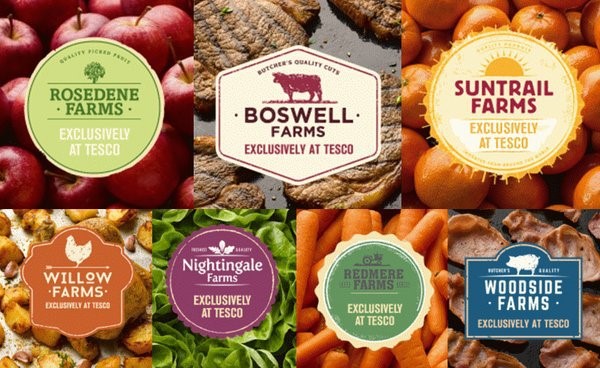Unexpected item in the branding area

Thanks to the ever-increasing high street presence of specialist grocers and artisan produce, and the consumer demand on retailers to provide a wider range of products, the UK supermarket scene is rapidly changing.
Products from coconut water to dairy-free chocolate mousse are now sold widely, a world away from the UK’s first supermarket, Premier Supermarkets, which opened its doors along Streatham High Road in 1951
Yet, despite shifts in consumption patterns, it is arguably the entry of European retailers into the UK supermarket trade that is having the biggest impact on product ranges offered. This in turn has impacted branding strategies – the most recent example of this is Tesco, which has recently unveiled a new line of fresh vegetable and meat products under a new brand name.
Similar to the Aldi retail model, Tesco has moved away from promoting its value range under its name.
Instead, the supermarket’s new ranges are labelled as being sourced from British-sounding farms, with a variety of farm names according to the product on offer. Rosedene Farms is the packaging name assigned to berries, apples and pears. Beef products are now sold under the Boswell Farms name; there are five other ‘farms’ to label varying products, from chicken to imported fruit.
Yet, Tesco is being scrutinised for this shift in brand strategy, with critics suggesting that Tesco’s products are not actually sourced from farms or places in Britain with the name they carry.
With some apparently sourced from as far afield as New Zealand and South America, Tesco’s reputation as a purveyor of British produce is being called into question – yet this issue of brand trust is something every supermarket faces on an almost daily basis.
Marketing own-brand products as a viable alternative to well-established and loved brand names is traditionally a source of frustration for retailers, with many consumers simply preferring to stick with a recognisable product name. Customers cite preference for branded products due to their integration into their lifestyle, or because of a strong heritage association with the brand name. For example, if their parents used a specific products, a consumer would be more likely to purchase it.
This considered, heritage association is undoubtedly a factor behind Tesco rebranding its own-label product – the farm association appears more authentic and rustic. Yet, some have argued that using potentially contrived names detracts from the customer right to know from where their products are derived. It has also called into question ethical issues surrounding environmentalism and product sourcing.
Germany-based supermarket Aldi, on the other hand, has enjoyed great success with the Ashfield Farms brand, its own discount meat and poultry range. With a perception among consumers and stakeholders that use of the ‘farm’ description adds credence and quality assurance to the product, Aldi were able to avoid assigning a discount brand image to its merchandise.
With food waste another issue increasingly present in the consumer conscience, perhaps Tesco's recent pledge to donate all unsold food to charity is a key way for the company to win back customer favour.












